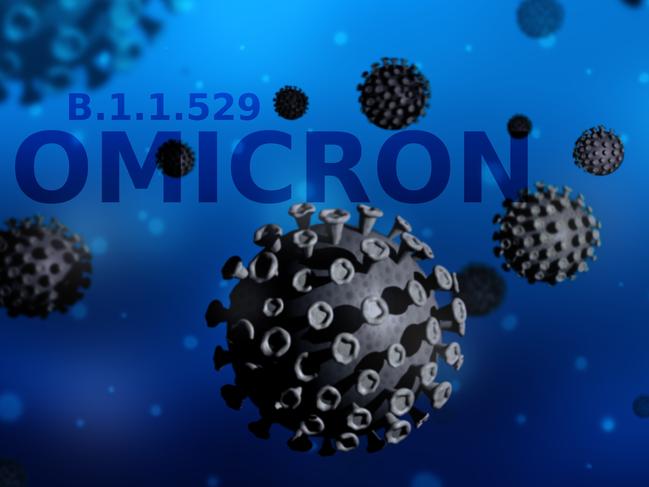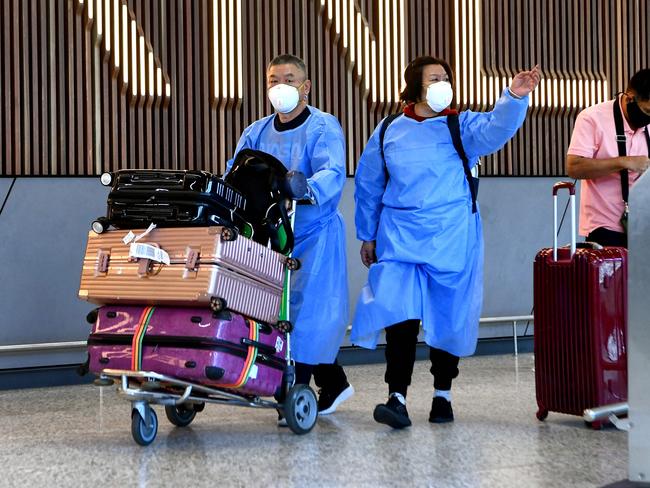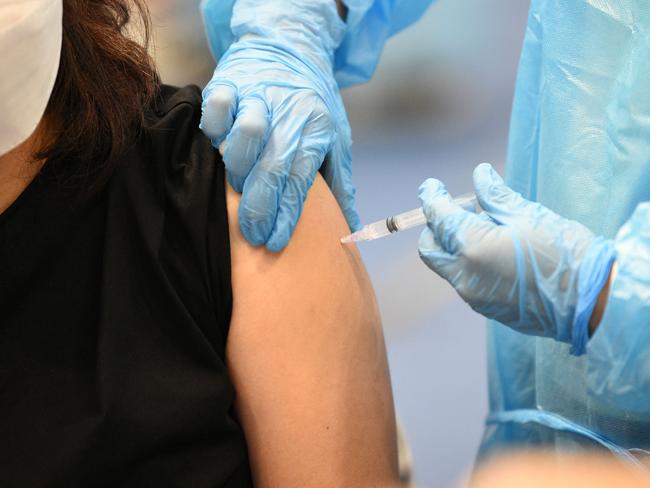Omicron: Experts answer all your questions about the new Covid-19 strain
Will the Omicron strain of Covid have deadly effects, or could it just be a fizzer? Experts with the Australian Science Media Centre answer the tough questions.

SA News
Don't miss out on the headlines from SA News. Followed categories will be added to My News.
A new mutant strain of Covid-19, dubbed Omicron, has sparked panic across the globe. Here we try and answer some common questions with help from the Australian Science Media Centre.
Where did Omicron come from?
Dr Deborah Cromer is group leader of Infection Epidemiology and Policy Analytics and a senior research fellow at the Kirby Institute, UNSW:
The emergence of a new variant, though unsettling, is far from unexpected.
Viruses constantly mutate and take on new forms, and the level of existing immunity against a new variant is key in determining the impact an emerging strain will have.
Virologist Dr Vinod Balasubramaniam from the Jeffrey Cheah School of Medicine and Health Sciences at Monash University in Malaysia:
The B.1.1.529 variant (now dubbed “Omicron”) was first reported to WHO from South Africa on November 24, 2021. The epidemiological situation in South Africa has been characterised by three distinct peaks in reported cases, the latest of which was predominantly the Delta variant. In recent weeks, infections have increased steeply, coinciding with the detection of B.1.1.529 variant. The first known confirmed B.1.1.529 infection was from a specimen collected on November 9, 2021. This variant has a large number of mutations, some of which are concerning. Preliminary evidence suggests an increased risk of reinfection with this variant, as compared to other VOCs (variants of concern).
The number of cases of this variant appears to be increasing in almost all provinces in South Africa. Current SARS-CoV-2 PCR diagnostics continue to detect this variant.
How was it formed?
Dr Balasubramaniam says:
Vaccine equity is a real problem and is leading to the emergence of newer and possibly more lethal strains.
Every time the virus reproduces inside someone there’s a chance of it mutating and a new variant emerging. This is a numbers game.
It’s a random process, a bit like rolling dice. The more you roll, the greater the chance of new variants appearing. It’s basically a ticking time bomb.
How do we stop it?
Dr Balasubramaniam says:
The main way to stop variants is equal global vaccination. We must get vaccines to these people as quickly as possible, especially in countries which are behind in vaccination rate, both to help the people there who are vulnerable but also to stop new variants from emerging.
The Omicron variant … contains the recipe for disaster.
But countries cannot rest on their laurels and risk another variant to be wreaking havoc similar to what Delta is doing currently.
We must stay vigilant and tighten control, testing at our borders and monitor this development closely.
Is this a good thing for living with the virus if it is less severe variant and it takes over from Delta?
Dr Rob Grenfell, special health adviser at CSIRO:
Indeed, if this is less serious and becomes the dominant variant then it could be the next step in living with COVID-19.
Dr Deborah Cromer:
Primarily what will be important for Australians in the short term is how well existing vaccines work against the new variant. If our vaccines are still able to protect against severe disease resulting from Omicron infection then we will be well placed from a public health perspective. In the longer term, and from a global health point of view, a more mild variant would be a positive for countries with low levels of vaccination and immunity.
Why has it been deemed a variant of concern?
Dr Balasubramaniam:
This new variant which descends from the B.1.1 lineage is unprecedented and very unusual in the number of mutations it has.
B.1.1.529 has 32 mutations located in its spike protein.
The 32 mutations detected in the new variant’s spike protein will change the shape of this structure, making it problematic for the immune response induced by the vaccines. These mutations can make the spike protein less recognisable to our antibodies.
As a result, they won’t be as effective at neutralising the virus, which is then able to slip past immune defences and cause infection.
Associate Professor Sanjaya Senanayake is a specialist in infectious diseases at the Australian National University:
Not all Covid-19 variants cause trouble. So it is possible that the new variant, Omicron, could fizzle out, hopefully.
But Omicron is troubling in terms of its mutations and the limited infections that have been seen in people. It has a lot of mutations, more … than seen before with previous variants.
Some of these mutations can increase transmissibility of the variant, while others can help it evade the immune system (which is) a worrying combination.
In terms of behaviour in people, the WHO has said that there’s an increased risk of reinfection with Omicron compared with other variants of concern.
The WHO suggested that it is growing at a faster rate than previous infection surges, suggesting it could be more infectious than Delta.
The limitations here are that it is still early in the discovery of the variant, so time will tell if these initial trends persist.
It will also take time to determine the effectiveness of our current vaccines against Omicron, involving both observational and laboratory data.

Catherine Bennett is the inaugural chair in epidemiology in the Faculty of Health at Deakin University:
We are yet to understand if Omicron is a threat, but there are enough warning signs to warrant the precautions to limit global spread – the larger number of mutations focused in the same area of the spike that most vaccines target, a rapid rise in cases in South Africa linked to its emergence, and reports of high rates of reinfection.
How contagious is it and why? How does it compare to other strains such as Delta?
Professor Raina MacIntyre is head of the biosecurity program at the Kirby Institute for Infection and Immunity in Society at UNSW:
Genetic mutations indicate the Omicron variant has enhanced transmissibility.
Preliminary analysis … suggests the R0 could be much higher than for Delta so much more transmissible.
This makes border control important in the short term to buy us time to get our third dose coverage high, vaccinate kids and make procurement plans for vaccines and antivirals.
We must also address safe indoor air, and keep using masks in indoor spaces.
It is critical to maintain high testing and tracing rates in Australia. Moves to stop QR codes, or in the case of Victoria, to get infected patients to notify their own contacts, will make epidemic control impossible if this variant takes off.
What does it do to a patient? What symptoms does it bring? How serious are those symptoms? And compared with other strains? What side effects are known from it?
Professor MacIntyre:
So far the virus has not mutated to become less severe – in fact the opposite. The WHO urges caution in interpreting preliminary reports from a South African doctor of mild symptoms in a small group of patients. Proper epidemiologic data are required to determine the relative severity of this variant.
Are vaccines effective against this strain?
Professor MacIntyre:
We do not have enough data to determine vaccine effectiveness against Omicron or disease severity, so any claims about either at this stage are not evidence-based.
Vaccines will still likely provide protection against severe disease, but we do not yet have data to quantify this.

How will getting a booster shot mitigate risk?
Dr Grenfell:
The vaccines work on stimulating the immune system by exposure to a replicant of the viral spike protein.
This immunity has been demonstrated to be strong against emerging variants to date.
It is expected that the current vaccines will continue to provide immunity against the Omicron variant – the question is how strong this may be, which is unknown at this time.
What is being done to understand more about it?
Dr Stuart Turville is associate professor in the Immunovirology and Pathogenesis Program at the Kirby Institute, UNSW
Key now is how this virus will expand in the real world. Will it outcompete Delta? What will the disease severity and mortality rates be for this variant vaccinated and unvaccinated. Will prevalence in children be low and also disease severity?
At this stage the numbers are too low to have the above real world data. We don’t know and it’s “watch and see”.
Closed borders only buy some time for some countries. In many cases the variant may be already in the community. Pragmatically, good quarantine is a better option and enables study of the virus with no community spread. We did this in 2021 and developed rapid systems to understand viruses like this within one week within the lab.
More Coverage
Originally published as Omicron: Experts answer all your questions about the new Covid-19 strain





